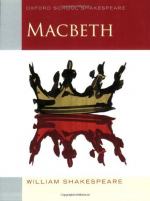|
This section contains 721 words (approx. 2 pages at 400 words per page) |

|
One of the most significant reasons for the enduring critical interest in Macbeth's character is that he represents humankind's universal propensity to temptation and sin. Macbeth's excessive ambition motivates him to murder Duncan, and once the evil act is accomplished, he sets into motion a series of sinister events that ultimately lead to his downfall. But Macbeth is not merely a coldblooded, calculating murderer; even before he kills the king, he is greatly troubled by his conscience. While plotting Duncan's murder, his better nature warns him that the act is wrong; he nearly persuades himself to reject the plan, but his wife forces him to reaffirm his determination. In addition, Macbeth possesses a powerful imaginationdemonstrated by his excessive philosophizing over his condition-that sways .his actions. In fact, the hero's imagination contributes greatly to his decision to murder Duncan: after his first meeting with the Weird Sisters...
|
This section contains 721 words (approx. 2 pages at 400 words per page) |

|




